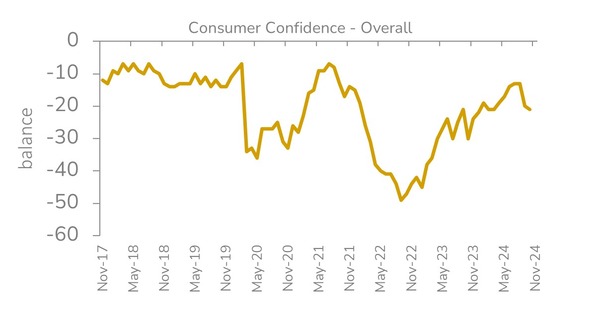UK Furniture & Flooring Sector Report summary
October 2024
Period covered: Period covered: 25 August – 28 September 2024
3 minute read
Note: This report summary is one or two months behind the current month as standard reporting practice. The content is indicative only and incomplete with certain data undisclosed. Become a member to access this data or take out a free 30 day membership trial now.
Furniture & Flooring – Retail Economics Index
Furniture and Flooring experienced a xx% YoY decline in September, making it the lowest-performing retail category.
However, there are indications of improvement, as the decline was less severe than the average xx% YoY drop observed over the past three months
Cautious consumer activity in the Furniture & Flooring category is prompted by various factors outlined below.
Entertainment over furnishings
Non-essential card spending rose by xx% YoY in September, the highest growth since September 2023 (Barclays).
However, consumers shifted focus to categories like entertainment (+xx%) and digital content (+xx%) as many consumers allocated funds to other areas or saved for Christmas, leading to reduced demand for household goods (Barclays). The significant boost in entertainment spending was driven by events such as the release of concert tickets for reformed rock band Oasis, highlighting a trend where consumers prioritise experiences over non-essential items.
Consumer confidence dips: Headline consumer confidence dropped sharply, falling seven points to -xx in September, indicating broader economic concerns (GFK). The anticipation of a ‘painful’ budget further dampened confidence, with upcoming tax and spending changes creating uncertainty around disposable income levels.
Stormy weather dampens footfall: This cautious consumer sentiment compounded in retail footfall that was negatively affected by flooding in parts of the UK, leading to a xx% decline across all retail destinations in September (MRI Software).
Strained Budgets Amid Easing Inflation: Headline inflation fell to xx% YoY in September, down from xx% in August, but consumers continue to grapple with the effects of the cost-of-living crisis. Compared to three years ago, budgets are still under pressure for most demographic groups. The least affluent have experienced double-digit declines in discretionary income since 2021, highlighting their vulnerability amid rising living costs.
Wage growth slows as job concerns curb big purchases: Wage growth slowed, with regular earnings growing by xx% and total earnings by xx% from June to August 2024. This reduction broadly aligns with a drop in inflation, maintaining real earnings growth around 2%.
Take out a FREE 30 day membership trial to read the full report.
Consumer confidence dips
 Source: ONS, GfK Consumer Confidence
Source: ONS, GfK Consumer Confidence